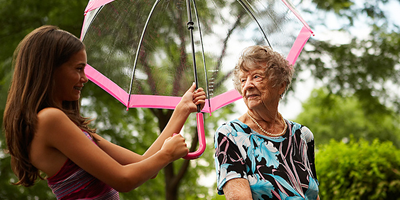

VATICAN CITY – The “International Day of Older Persons” is celebrated Oct. 1 and the Pontifical Council for Health Care Workers (for Health Pastoral Care) marked the event by publishing a message about “the value of the life of the elderly” from its president, Archbishop Zygmunt Zimowski.
“This international day”, the prelate wrote, “constitutes an important occasion, destined to assume ever greater relevance, considering that there estimated to be over 600 million older people in the world, and that the progressive aging of the world population could, within a decade, bring this figure to over a billion elderly people. Therefore, we are all called to collaborate everywhere, Christians and persons of good will, in the pursuit of a juster and more equitable society, enriched also by the effective participation of those who are at times considered ‘not useful’ or even as a ‘burden’, but who may instead offer a contribution based on the experience and wisdom acquired throughout life.”
“In many societies in so-called ‘rich’ countries, ensuring that the elderly are and remain ‘co-protagonists’ in social life means, in addition, facing the reality of increasing longevity, due to various factors including the growth of knowledge in medical and scientific fields,” the archbishop continued. “This longevity cannot, therefore, simply be a question of greater survival time, but should rather be accorded its due value in a respectful and appropriate manner, starting with the wishes and characteristics of the elderly and considering the context to which they belong.”
Solidarity between the young and the elderly leads to the understanding that “the Church is effectively the family of all generations, in which everyone must feel at home, which must not be guided by the logic of profit and of ‘having’, but rather by that of gratuitousness and love,” he said. “When during old age life becomes fragile, it never loses its value nor its dignity; everyone is wanted and loved by God, everyone is important and necessary. … In this way there enters the value of a specific pastoral care, which includes first and foremost the fundamental element of communion between generations. … It regards the promotion of a culture of unity: unity between generations, which must not regard each other as detached or indeed opposed; a vision of life that allows new generations to grow, immersed daily in this culture of unity, to which each person brings an indispensable contribution.”
Archbishop Zimowski emphasized that this form of pastoral care should be a pastoral “of” rather than “for” the elderly, as “the older person is not first of all the object of care and charitable pastoral attention, but rather a subject and potential agent of pastoral action”, and insists that “religious assistance to the elderly should, indeed, be a commitment made by the Christian community as a whole”. The Pontifical Council for Health Care Workers (for Health Pastoral Care) has organized an International Conference dedicated to “the Church in the service of the elderly patient: the care of persons affected by neurodegenerative pathologies.”
“From a Christian perspective, indeed, old age is not the decline of life, but rather its fulfillment: the synthesis of what one has learnt and lived, the synthesis of how much one has suffered, rejoiced, and withstood,” the archbishop said.
